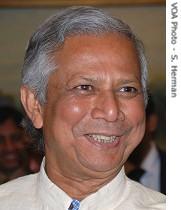-
(单词翻译:双击或拖选)
Microfinance is becoming a big business. It started as a way to provide very small loans to people in developing countries so they could begin to move themselves out of poverty. A few hundred dollars could mean a lot to a poor entrepreneur with a promising1 idea.
 |
| Mohammed Yunus |
Bangladeshi economist2 Mohammed Yunus won the Nobel Peace Prize in two thousand six for his work with banking3 for the poor. He formed the Grameen Bank in nineteen eighty-three. Today there are microfinance providers all over the world.
And anyone can be a microlender through a site like Kiva.org. You choose a project and provide at least twenty-five dollars of the amount requested. Three out of four loans have gone to women, which is common with microfinance.
Kiva spokeswoman Fiona Ramsey says the site has grown even with the economic downturn. The total value of loans made through Kiva, she says, is nearing fifty-two million dollars.
The downturn has not had a big effect on loan repayments5 either. The current repayment4 rate is ninety-seven percent. But Fiona Ramsey says that because of the credit crisis, microfinance organizations are finding it harder to get loans from banks.
Kiva works with microfinance organizations in forty-two countries. These "field partners" keep the interest charged on the loans. The average term is twelve months. And the average interest rate is almost twenty-three percent.
Returns like that help explain why microfinance now includes big banks and other lenders. Mohammed Yunus has said he worries that lenders may be more interested in profits than poverty reduction.
He supports a new effort based in the United States called MicroFinance Transparency. The aim is to prevent abuses by letting borrowers compare pricing information from different lenders. Its creator, Chuck Waterfield, calls it "an industry-based truth-in-lending effort."
Borrowers, he says, are often misled about the true price of a loan. "For twenty years we set the price to cover the cost. Now, some organizations are setting the price to whatever they can get away with," he says.
The first step is to publish information collected from eight countries. Chuck Waterfield says information from Peru, Bosnia and Cambodia will appear in February at the Web site mftransparency.org. He says the others, including at least one country from Africa, will follow a few months later.
And that's the VOA Special English Development Report, written by Karen Leggett. I’m Jim Tedder6.
 收听单词发音
收听单词发音
1
promising

|
|
| adj.有希望的,有前途的 | |
参考例句: |
|
|
|
2
economist

|
|
| n.经济学家,经济专家,节俭的人 | |
参考例句: |
|
|
|
3
banking

|
|
| n.银行业,银行学,金融业 | |
参考例句: |
|
|
|
4
repayment

|
|
| n.偿还,偿还款;报酬 | |
参考例句: |
|
|
|
5
repayments

|
|
| 偿还,报答,偿付的钱物( repayment的名词复数 ) | |
参考例句: |
|
|
|
6
tedder

|
|
| n.(干草)翻晒者,翻晒机 | |
参考例句: |
|
|
|















